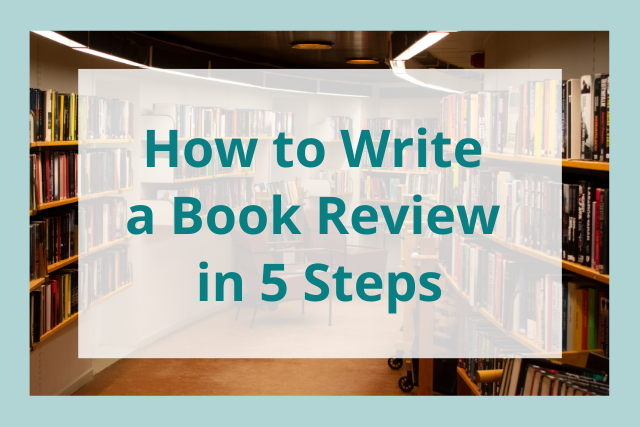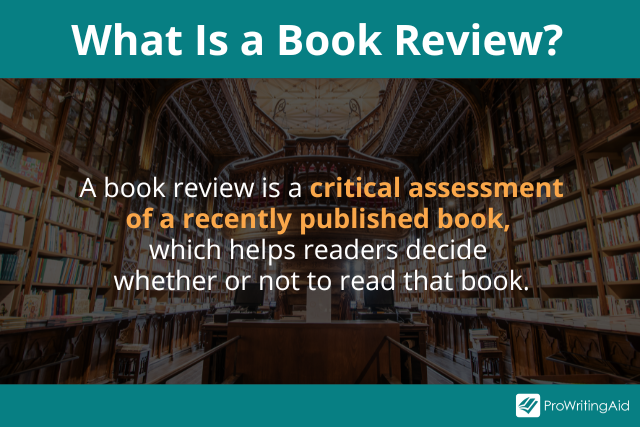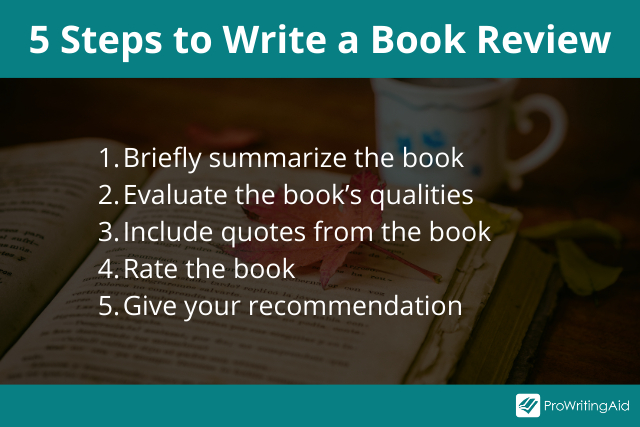
If you love to read books, you might be looking for ways to share your opinions about your recent reads.
Writing book reviews is a great way to engage with the book-loving community. If your reviews gain a large enough following, you might even get paid to read books—every reader’s dream come true!
So how exactly do you write book reviews?
This article will explain what a book review is and give you a step-by-step guide for writing a good one.
What Is a Book Review?
A book review is a critical assessment of a recently published book. Looking at book reviews helps readers figure out which books to read next and which books to avoid.
The average book review is around 300–750 words. It includes a quick summary of the book, the reviewer’s evaluation of the book, and a recommendation about who should read this book.
It’s important not to confuse book reviews with book reports. A book report is a summary that proves you understood the book, often assigned to elementary school or middle school students.

Book reviews, on the other hand, should offer a unique perspective on a book. They’re often assigned to undergraduate or graduate students.
Professional book reviews can be published in academic journals, on the reviewer’s personal blog, or on platforms like Goodreads.
How to Review a Book in 5 Steps
Here are five steps you can follow to write your own book review.
1. Briefly Summarize the Book
If you’re wondering how to start a book review, the answer is simple—start by summarizing the story!
A quick and objective summary, similar to the one you might find on the book jacket, gives your readers a sense of what the book is about. That way, they have enough context to understand the rest of your review.
If the book is nonfiction, you should include the major questions the book examines, the ways the book tries to answer those questions, and any relevant details about the author’s credentials.
If the book is a novel, you should include the genre, the main character, and the events that launch the main character into the story.
However, it’s important not to spoil the story for people who haven’t read it yet. A good rule is not to mention anything that happens after the midpoint of the story. Leave the rest for the readers to discover on their own.

2. Evaluate the Book’s Qualities
Once you’ve explained the premise of the book, it’s time to provide a more subjective evaluation of the strengths and weaknesses of the book. What do you want other readers to know about this book?
Here are some different aspects of a nonfiction book you can evaluate:
- Key takeaways (e.g. What did you learn? What’s the book’s argument?)
- Readability (e.g. What background knowledge do readers need to understand this?)
- Prose (e.g. How are the points communicated? What’s the author’s writing style?)
Here are some different aspects of a novel you can evaluate:
- Characters (e.g. How well-developed is the protagonist? The villain? The love interest?)
- Plot (e.g. Are there surprising twists? Subverted tropes? Plot holes?)
- Worldbuilding (e.g. Is the world of the story immersive? Unique? Original?)
- Theme (e.g. What questions does the story examine? How does it answer those questions?)
- Prose (e.g. Is the writing lyrical or plain? Funny or serious? Dense or digestible?)
Many reviewers focus on one aspect for each of the paragraphs in their review.
As much as possible, try to balance the good with the bad. If the entire review is glowing, or if the entire review is critical, it won’t feel as objective as one that mentions both positive and negative qualities.
Also, make sure you include spoiler warnings if you’re going to mention anything that happens after the midpoint of the story. Some book review platforms let you hide those passages of your review until readers click on them.
3. Include Quotes from the Book
Quotes from the book can serve as useful supporting evidence for your key points. If you say the book includes lyrical prose, make sure to include a passage that represents the lyrical style of the book, so your readers can see what you mean.
You can include well-written passages that showcase the author’s talent. If you disliked the book, you can also choose quotes that showcase what you disliked most.
4. Rate the Book
Many book review platforms, such as Goodreads, let you give a star rating to each book you review.
You can develop your own rating system if you’d like. For example, you could rate books on a scale of 1–5, 1–10, or even 1–100.
Some reviewers break down their ratings into multiple categories. For example, you might give a book five stars for its characters, but only two stars for its plot.
5. Give Your Recommendation
Finish your book review by stating whether or not you would recommend this book to others. That’s the main purpose of a book review, after all—to convince readers either to read the book or to skip it.
It can be helpful to say exactly what kinds of readers you’d recommend it to.
For example, you might write, “This book is perfect for anyone who loves swing dancing and slow-burn romance,” or “Don’t read this if you don’t like slow, atmospheric books that focus more on vibes than on plot.”
You can also recommend other books in the same genre that you think fellow readers will enjoy if they liked this one. “If you liked A Song of Ice and Fire by George R.R. Martin, we recommend The Name of the Wind by Patrick Rothfuss and The Way of Kings by Brandon Sanderson.”
Best Book Review Examples
One way to learn how to write great book reviews is by reading them. Let’s look at a few examples of great book reviews you can use as inspiration.
Kirkus Reviews is a well-known American book review magazine. Here’s the beginning of their review of The Seven Husbands of Evelyn Hugo, a historical fiction novel by Taylor Jenkins Reid.
An aging starlet with seven marriages behind her generously offers the rights to her memoir to an inexperienced writer—at a heartbreaking cost.
Monique Grant is stunned when Hollywood legend Evelyn Hugo grants an exclusive interview to her over more seasoned journalists, but when she’s also chosen to publish Evelyn’s final confessions after her death, she learns that the 79-year-old actress has enough life experience for them both. Growing up poor in Hell’s Kitchen, young Evelyn Herrera trades her virginity for a ride to Hollywood, changes her name, and climbs the rungs of the entertainment-industry ladder one husband at a time until she hits Oscar gold. To write her off as being calculating and fickle would leave out the difficulty of being a woman, especially a woman of color, trying to get by in the late 1950s without a man’s blessing.
Emily May is a UK-based book reviewer who’s one of the top-ranked reviewers on Goodreads. Here are the first few paragraphs of her Goodreads review of The Poppy War, a fantasy novel by R.F. Kuang.
“But I warn you, little warrior. The price of power is pain.”
Holy hell, what did I just read??
A fantasy military school
A rich world based on modern Chinese history
Shamans and gods
Detailed characterization leading to unforgettable characters
Adorable, opium-smoking mentors
That’s a basic list, but this book is all of that and SO MUCH MORE. I know 100% that The Poppy War will be one of my best reads of 2018.
Finally, Book Geeks is a website that describes itself as “India’s best book blog.” Here’s the beginning of their review of Eat Pray Love by Elizabeth Gilbert.
WRITING STYLE: 3.5/5
SUBJECT: 4/5
CANDIDNESS: 4.5/5
RELEVANCE: 3.5/5
ENTERTAINMENT QUOTIENT: 3.5/5
Eat Pray Love is so popular that it is almost impossible to not read it.
Having felt ashamed many times on my not having read this book, I quietly ordered the book (before I saw the movie) from Amazon and sat down to read it.
I don’t remember what I expected it to be—maybe more like a chick-lit but it turned out quite different.
The book is a real story and is a short journal from the time when its writer went travelling to three different countries in pursuit of three different things—Italy (Pleasure), India (Spirituality), Bali (Balance) and this is what corresponds to the book’s name—EAT (in Italy), PRAY (in India), and LOVE (in Bali, Indonesia).
How to Be a Book Reviewer
There are many benefits to becoming a consistent book reviewer.
After you establish a following, many publishing houses will send you books for free in exchange for a review, which can be a huge perk. In some cases, you can even get paid for your reviews.
So how do you become a book reviewer? Here are a few tips:
Develop your own book reviewing style to give your reviews a more personal touch. Do you want to leave funny reviews that make readers laugh? Personal reviews that include anecdotes from your own life? Serious reviews that readers can trust for an objective opinion?
Start taking notes every time you read a book you’re planning to review. Recording your initial reactions can help you develop more insightful critiques.
Finally, set book reviewing goals and stick to them. For example, you might decide to start by reviewing one book a month. That way, you can turn reviewing into a consistent practice.
Good luck, and happy writing!

